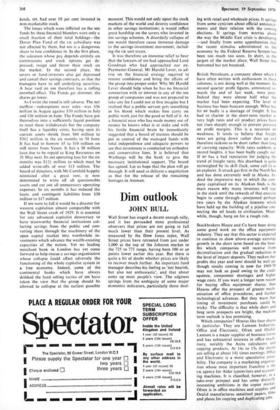Dim outlook
JOHN BULL
Wall Street has staged a decent enough rally, and it has persuaded most professional observers that prices are not going to fall much lower than their present level. As measured by the Dow Jones index, Wall Street prices have retreated from just under 1,000 at the top of the Johnson market to the 725 to 775 range, having been 100 or so points lower earlier this year. But there is quite a bit of doubt whether prices are likely to recover much further. An important fund manager describes his feeling as 'not bearish, but also not enthusiastic', and that about sums up most people's view. The edginess springs from the ambiguity of some major economic indicators, particularly those deal- ing with retail and wholesale prices. It springs from some cynicism about official announce. ments and their relation with the coming elections. It springs from worries about the way the Middle East crisis is developing —and finally from some apprehension that the recent stimulus administered to the economy by the Federal Reserve System has been too much too soon. In short, in the jargon of the market place, Wall Street has bottomed but not bounced.
British Petroleum, a company about which I have often written with enthusiasm in these columns, is not doing well at the moment. Its second quarter profit figures, announced to- wards the end of last week, were poor. Indeed they were almost half what the market had been expecting. The level of business has been buoyant enough. What has hit BP badly is a shortage of freight. It has had to charter in the short-term market at very high rates and oil product prices have not risen sharply enough to prevent pressure on profit margins. This is a recurrent BP weakness. It tends to believe that freight rates are going down rather than up and therefore reckons to be short rather than long of carrying capacity. With rates suddenly at record heights, it has been badly caught out. If BP has a bad reputation for judging the trend of freight rates, this drawback is quite outweighed by its skill (luck, some call it) as an explorer. It struck gas first in the North Sea and has done extremely well in Alaska. In- deed the impressive way in which the com- pany capitalised on its Alaskan finds is the main reason why many investors will stay in the stock until the rewards of that exercise begin to come through—postponed perhaps two years by the Alaskan interests which have held up the building of a pipeline con- necting the oil heads to civilisation. Mean- while, though, hang on for a rough ride.
Stockbrokers Hoare and Co have been doing some good work on the office equipment industry. They say that this sector is expected to continue to show above-average earnings growth in the short term based on the bene- fits which companies will receive from decimalisation and the gradual reduction in the level of import deposits. They reckon that profits this year and next should be well up. though results coming in now for 1969.70 may not look so good owing to the credit squeeze, component shortages and higher wage costs. If you want a longer term reason for buying office equipment shares, then Hoares offer the prospect of greater mech- anisation of office procedures, and further technological advances. But they warn that timing of investment purchases could be tricky. The difficulty is that while short and long term prospects are bright, the medium term outlook is less promising. Which companies? Hoares like four shares in particular. They are Lamson Industries. Office and Electronic, Ofrex and Ozalid. Lamson is a major supplier of business forms and has substantial interests in office mach- inery, notably the Anita calculators and copying products. At 14s to 15s the shares are selling at about 14-1 times earnings. Office and Electronic is a more speculative possi- bility. The company is a marketing organisa- tion whose most important franchise is the ux agency for Alder typewriters and account. ing machines. It is classified, however, as a take-over prospect and has some distinctly interesting ambitions in the copier market. Ofrex is in office machines and supplies and Ozalid manufactures sensitised papers, films and plates for copying and duplicating jobs-


































 Previous page
Previous page